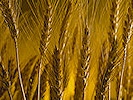
Last growing season and this year's season are about as far apart as any two seasons can be. That may or may not be good news, depending upon where you live and your point of view. A cool July forced maturity late into the fall a year ago, but yields were high. However, conditions were right to lead to ear rot diseases which produce mycotoxins. One of those, vomitoxin, or DON, causes problems at low levels in hogs. The first symptom is that pigs refuse to eat. At high enough levels, it can also affect cattle.
Bill Pickart, a retired farmer and former Indiana Prairie Farmer and Purdue University College of Agriculture Master Farmer, class of 1990, now works with Select Seeds, Camden. He says conditions in his area favor a big corn harvest, except for spots that drowned out this year. Where water stood in June, corn typically died. In many years, it only results in stunted, yellow corn. Some speculate that the high heat readings that existed when corn stood in water led to corn dying this season. There must be close to a record number of holes in cornfields in some counties.
The up side is that vomitoxin shouldn't be an issue, Pickart says. He expects corn harvest to begin at the end of this month. It would appear that there wouldn't b a window for ear rots that produce vomitoxins to develop yet before harvest.
Some growers report that elevators did check for vomitoxin in wheat this summer, after some got burnt with vomitoxin on corn they sold to the next consumer up the chain last year. Conditions favored vomitoxin in some wheat fields, especially in southeast and east-central Indiana. Again as last fall, farmers found that docks varied depending upon the elevator you were with. According to one farmer, one elevator was going to dock him 30 cents per bushel. He drove to another elevator operator, and found they would take the wheat for only a 10 cent per bushel dock.
Many noted last year that 2009 was likely a one in 20 season. The 2010 season may come out the same way, but in the opposite direction. Harvest may start early, not late. Vomitoxin may not be an issue. Lower test weight could be if corn dies prematurely and there isn't enough starches placed into kernels at the last minute. That remains to be seen.
About the Author(s)
You May Also Like




